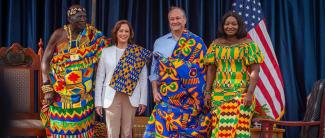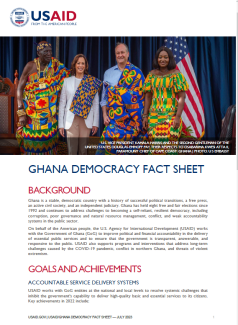BACKGROUND
Ghana is a stable, democratic country with a history of successful political transitions, a free press, an active civil society, and an independent judiciary. Ghana has held eight free and fair elections since 1992 and continues to address challenges to becoming a self-reliant, resilient democracy, including corruption, poor governance and natural resource management, conflict, and weak accountability
systems in the public sector.
On behalf of the American people, the U.S. Agency for International Development (USAID) works with the Government of Ghana (GoG) to improve political and financial accountability in the delivery of essential public services and to ensure that the government is transparent, answerable, and
responsive to the public. USAID also supports programs and interventions that address long-term challenges caused by the COVID-19 pandemic, conflict in northern Ghana, and threats of violent extremism.
GOALS AND ACHIEVEMENTS
ACCOUNTABLE SERVICE DELIVERY SYSTEMS
USAID works with GoG entities at the national and local levels to resolve systemic challenges that inhibit the government's capability to deliver high-quality basic and essential services to its citizens.
Key achievements in 2022 include:
- Strengthened local governments' capacity to engage with citizens and respond to their concerns in 50 districts.
- Increased citizens' oversight and feedback on public service delivery to improve service quality.
- Promoted citizens' participation in social service planning and implementation to align with their priorities.
- Developed a District Agriculture Governance Index (DAGI) to enhance data collection for better agriculture development.
CIVIL SOCIETY EFFECTIVENESS
USAID partners with civil society to enhance electoral transparency and local government accountability and service delivery and strengthen conflict management and mitigation mechanisms to improve peace and stability. USAID strengthens the capabilities of civil society actors to advocate,
monitor, and investigate the efforts of primary actors, especially government, to ensure sustainable, accountable, and inclusive delivery of quality services to citizens.
Key achievements in 2022 include:
- Verified Ghana's 2020 presidential election results by training and deploying 4,000 election-day observers and independent vote tabulation to enhance election credibility and transparency.
- Increased civil society groups' integration and budgeting for community priorities in development plans from 12% to 51% in 50 districts for 2022-2025.
- Improved knowledge of justice administration from 28.8% to 57.4% in 40 targeted districts and increased legal cases resolved through ADR from 4.5% to 57.8%.
- Educated over five million citizens on legal aid and ADR services in 40 target districts and trained Legal Aid Commission staff to promote ADR use among the poor and indigent.
SUSTAINABLE DEVELOPMENT IN NORTHERN GHANA
Ensuring the participation of all key actors in decision-making activities, including women and traditional authorities, is critical for ensuring an enabling environment for more effective local governance and sustainable development.
Key achievements in 2022 include:
- In partnership with the Northern Regional Peace Council, assisted the Dagbon Traditional Council in adopting a new Constitution that aligns with contemporary Ghanaian civic norms and laws and strengthens traditional governance.
- Empowered 3,169 women in shea butter processing to access finance and economic opportunities through their Village Saving and Loans Associations and supported over 3,000 women to participate effectively in decision-making and local governance advocacy.
MITIGATING CONFLICT AND PREVENTING VIOLENT EXTREMISM
When conflicts are reduced in northern Ghana and citizens, especially women and youth, advocate for the well-being of their families and the security of their communities, sustainable development in that part of the country can become possible.
Key achievements in 2022 include:
- Supported training in conflict mediation for 159 citizens and traditional authorities in northern Ghana, resulting in strengthened stakeholder collaboration and improved conflict management at the local levels.
- Contributed to resolving 47 conflicts in 2022 through an early warning mechanism to defuse tensions before escalating into violence in about 27 communities in the Mamprugu, Dagbon, Nanung, and Bimbillia traditional areas.
- Partnered with government agencies to engage 27,000 diverse stakeholders to promote peace and prevent as well as mitigate COVID-19-related conflict in northern Ghana.
- Resolved 47 conflicts in 2022 and strengthened the existing early warning system by working with 350 community monitors to prevent violence and address various issues, such as chieftaincy, land disputes, and ethnic conflicts.

U S EMBASSY

